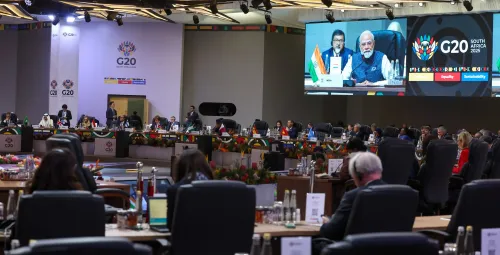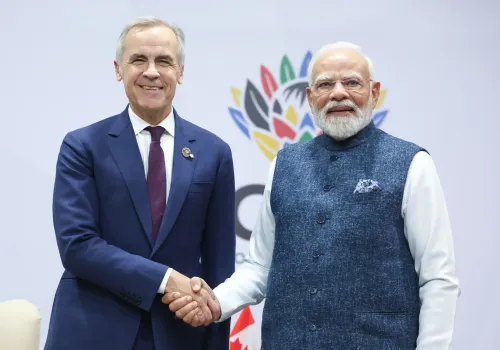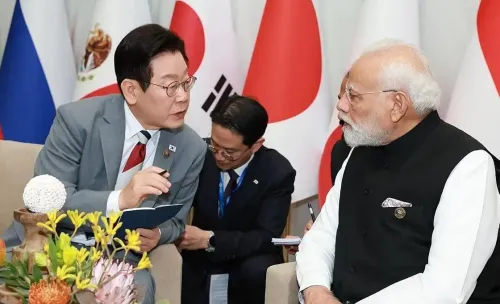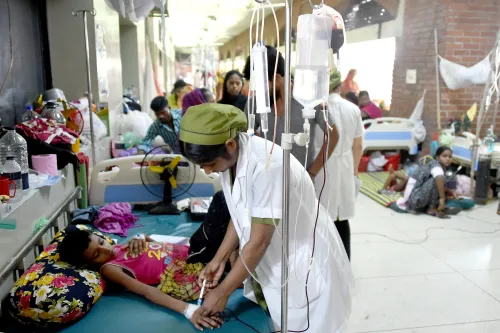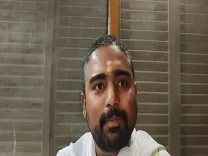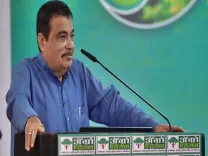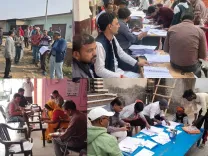South Korea Issues Strong Condemnation of Pahalgam Terror Attack
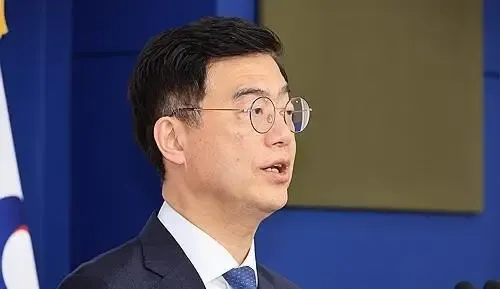
Synopsis
Key Takeaways
- South Korea strongly condemns the Pahalgam terror attack.
- The attack resulted in the deaths of 26 individuals.
- Global leaders expressed solidarity with India against terrorism.
- India announced significant diplomatic measures against Pakistan.
- The CCS emphasized the need for vigilance in response to terrorism.
Seoul, April 24 (NationPress) On Thursday, South Korea expressed strong condemnation regarding the Pahalgam terror attack in India's Jammu and Kashmir, which resulted in the tragic loss of numerous lives.
On Tuesday, 26 individuals, predominantly tourists, lost their lives in one of the most heinous attacks on civilians in India.
South Korea's foreign ministry articulated its deep concern over the lethal assault and extended heartfelt condolences to the victims, their families, and the Indian government.
"The government of the Republic of Korea expresses its profound concern over and strongly condemns the terrorist attack that occurred on April 22 in Pahalgam, Jammu and Kashmir, India, which resulted in many casualties. We extend our deepest sympathies to the innocent victims and their grieving families, as well as to the people and government of India," the ministry's statement noted.
"The government reiterates its unwavering stance that terrorism cannot be justified under any circumstances," the foreign ministry added.
Besides South Korea, India has garnered robust support from global governments, all denouncing the attack and reaffirming their commitment to a zero tolerance policy towards terrorism.
Former UK Prime Minister Rishi Sunak also condemned the barbaric attack in Pahalgam, stating it had taken the lives of innocent individuals and families in pursuit of happiness.
He remarked, "Britain stands in solidarity with India during this time of mourning, and terror will never triumph."
On social media platform X, Sunak expressed: "The barbaric attack in Pahalgam has claimed the lives of newlyweds, children, and families simply seeking joy. Our hearts ache for them. To those grieving, know that the UK stands with you in sorrow and solidarity. Terror will never win. We mourn with India."
The Peruvian Foreign Ministry also condemned the attack on X, stating: "Peru expresses its strongest condemnation of the terrorist attack that occurred yesterday in Pahalgam, Jammu and Kashmir, which resulted in 26 fatalities. We extend our deepest condolences to the victims' families."
Additionally, the ministry urged the international community to intensify efforts to combat and eradicate terrorism in all forms, expressing solidarity with the Indian government.
Margareta Cederfelt, a Swedish politician from the Moderate Party, expressed on X: "We, the Swedish-Indian Parliamentary Friendship Group, are profoundly saddened and strongly condemn the brutal #TerroristAttack in Pahalgam, Jammu and Kashmir. No justification exists for such atrocities. We extend our condolences to the victims' families #India."
Prime Minister Narendra Modi has thanked nations that extended their support to India following the terror attack, which was orchestrated by The Resistance Front, a Pakistan-based organization linked to Lashkar-e-Taiba.
The attack, carried out by the Pakistan-based terror group The Resistance Front, has prompted a series of sweeping retaliatory measures from India to hold Pakistan accountable for its role in cross-border terrorism.
The Cabinet Committee on Security (CCS), chaired by Prime Minister Narendra Modi, convened on Wednesday evening to discuss the implications of the attack, which claimed the lives of 25 Indian nationals and one Nepali citizen, while several others were injured.
The CCS expressed its deep condemnation of the attack and offered heartfelt condolences to the victims' families while wishing for the swift recovery of the injured. The attack, targeting tourists in a well-known destination, was attributed to Pakistan-backed terror factions, sources revealed.
The meeting acknowledged that the attack transpired against the backdrop of successful elections in Jammu and Kashmir and the ongoing progress towards economic development and stability in the region. India believes that these advancements are perceived as a threat by terrorist groups aiming to destabilize the area.
Recognizing the gravity of this attack and its cross-border connections, the CCS took the following unprecedented actions:
Indus Waters Treaty Suspended – In a significant decision, India has placed the Indus Waters Treaty of 1960 in abeyance with immediate effect. This historic move effectively halts decades of cooperation on water-sharing between India and Pakistan. The decision will remain in force until Pakistan takes credible and irreversible steps to abandon its support for cross-border terrorism.
Closure of Attari Integrated Check Post – In direct response to the terrorist attack, India has announced the immediate closure of the Integrated Check Post (ICP) at Attari, a key border crossing between the two nations. Pakistani nationals with valid travel endorsements have until May 1, 2025, to return to Pakistan through this route. Following this deadline, all land travel between India and Pakistan will cease.
Cancellation of SAARC Visa Exemption Scheme for Pakistani Nationals – In another decisive step, India has determined that Pakistani nationals will no longer be permitted to travel to India under the SAARC Visa Exemption Scheme (SVES). Any SVES visas previously issued to Pakistani nationals have been annulled, and those currently in India under this scheme have been given 48 hours to exit the country.
Persona Non Grata Declaration for Pakistani Diplomats – In a sharp diplomatic maneuver, India has declared Pakistan's Defence, Military, Naval, and Air Advisors in the Pakistani High Commission in New Delhi as Persona Non Grata. These officials have been given one week to leave India.
India has also announced the withdrawal of its Defence, Navy, and Air Advisors from the Indian High Commission in Islamabad, rendering all such positions null and void. Additionally, five support staff members for these service advisors will be withdrawn from both High Commissions.
Reduction in Diplomatic Staff – In a further diplomatic escalation, India has decided to reduce the overall number of personnel at the Indian High Commission in Islamabad and the Pakistani High Commission in New Delhi. The two embassies will be cut to a staff strength of 30, down from the current 55. This reduction will be implemented by May 1, 2025.
The CCS also reviewed the overall security situation and directed all Indian forces to maintain the utmost vigilance. India is committed to ensuring that the perpetrators of the Pahalgam attack are brought to justice, and that their sponsors will be held accountable. In line with its determined approach to combating terrorism, India reiterated its commitment to pursuing those responsible for terror attacks, referencing recent high-profile extraditions like that of Tahawwur Rana.
India's diplomatic actions indicate a shift towards the complete isolation of Pakistan until it ceases its support for terrorism. These measures reflect the government's resolve to counter Pakistan’s ongoing involvement in instigating violence on Indian soil, sending a clear message to the international community that terrorism will not be tolerated.

